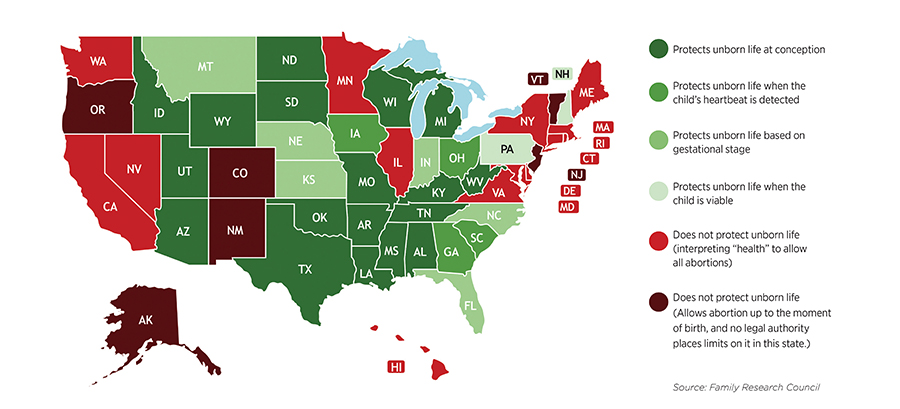Americans love to celebrate special days—birthdays, weddings and, of course, our wonderful holiday seasons.
For those of us who cherish human life and the Creator who made us, June 24, 2022, was not only a day to celebrate—it was a landmark day in our nation’s history. The Supreme Court, in a case called Dobbs v. Jackson Women’s Health Organization, admitted it had made a grave error when, in the 1973 Roe v. Wade decision, it overturned all state laws concerning abortion and found a nonexistent “right” to abortion in the Constitution. More than 60 million aborted lives and countless wounded women later, our country’s highest bench corrected a profound moral and constitutional wrong. Thanks be to God!
Although this long-sought victory for life is a cause for rejoicing, it marks not the end of the fight but the beginning of a new chapter in protecting the unborn and their mothers.
Where the Battle Lies
Without missing a beat, President Biden and his allies in Congress immediately began to rebuild the edifice of death erected by Roe. On July 8, Mr. Biden signed an executive order directing the U.S. Department of Health and Human Services to safeguard “access to … abortion and contraception,” including drug-induced abortion.
Liberals in Congress, responding to the June 24 Supreme Court ruling, passed the “Women’s Health Protection Act” in the House on July 15. The measure would codify abortion on demand into federal law. That same day, the House also voted for the more honestly titled “Ensuring Access to Abortion Act,” which would make it impossible for a state to prosecute rogue actors who help minors travel across state lines for abortion. Thankfully, neither bill is expected to get through the Senate.
What about the states? In Dobbs, the court did not say all abortions would now be illegal. Instead, it placed abortion back where it always had been—in the hands of our elected representatives. And that is where the battle now lies.
Thirteen states have “trigger” laws that were enacted to immediately prohibit elective abortion once Roe was corrected. For example, in Texas, the law says that within 30 days of the overturn of Roe, all abortions, other than those to save the life of the mother or protect her from serious injury, must end. Texas also has laws protecting unborn life when the child’s heartbeat is detected, when fetal pain might be felt by the unborn child, and when the unborn child can live outside her mother’s womb.
California, on the other hand, allows any abortion for the “health” of the mother—health defined so broadly as to effectively allow all abortions throughout pregnancy. California also allows abortions to be carried out by nonphysicians and in any health care setting after “viability.”

Of course, pro-abortion organizations and legal groups have filed numerous lawsuits to prevent pro-life state laws from going forward. In at least nine states, groups supporting abortion on demand have filed suits against pro-life laws on the books. One such case is in Arizona, where a pro-abortion group succeeded in getting a federal judge to block “a 2021 Arizona law recognizing the personhood of a fetus from the moment of fertilization.”
So, state family policy councils, pro-life legal groups like Alliance Defending Freedom and political leaders who believe in the right to life are working, and will continue to work, to protect and advance the culture of life in law and public policy.
What Pro-Life States Are Doing
In addition to fighting the assaults of the left on the sanctity of life, pro-life leaders are moving forward to strengthen protections for unborn babies and their moms. In Mississippi, Republican Gov. Tate Reeves has signed a law authorizing a $3.5 million tax credit for individuals and businesses that donate to nonprofit pregnancy resource centers (PRCs) in the Magnolia State.
Similarly, Texas’ “Choose Life” grant program offers funding to PRCs to help women who need practical help as they prepare for motherhood.
The Work of the Body of Christ
In spite of the progress we’ve seen, there’s much more work to do.
Consider the heroic work of the nearly 3,000 PRCs where volunteers offer everything from ultrasound testing and medical care to parenting education and job training for moms and dads. One study shows that in 2019, PRCs served almost 2 million people.
The PRCs need active support, ranging from trained volunteers to funds to help them stay fiscally healthy in order to purchase everything from diapers to car seats.
Then there’s the adoption movement. So many loving Christian families have adopted children. Now, though, since there will likely be more little ones who need moms and dads, it’s time for churches across America to do all they can to provide homes for these precious children.
For example, Immanuel Bible Church in Springfield, Virginia, has a “Woven Families” ministry that provides prayer, financial and post-adoption support to qualified parents who adopt. Many churches across America have similar compassionate and very practical ministries. This kind of support—spiritual, emotional, material and financial—is critical and must be increased in the coming months and years.
A Weapon the World Cannot Duplicate
Christians possess a unique weapon: the ability to petition a faithful Savior, an Advocate before the Father, the Lord Jesus Christ. We must pray for women considering abortion, for children needing homes, for the church at large—that all believers would come to understand that supporting life is essential to our witness. And we need to pray for our opponents in politics, law, the media, and perhaps even our own families, whose spiritual blindness prevents them from honoring life in the womb.
God has heard our prayers about Roe. He will continue hearing our prayers as we work to create a culture that welcomes all children into life. Now, that’s something to celebrate! ©2022 Tony Perkins
Tony Perkins is president of Family Research Council and executive editor of The Washington Stand.
